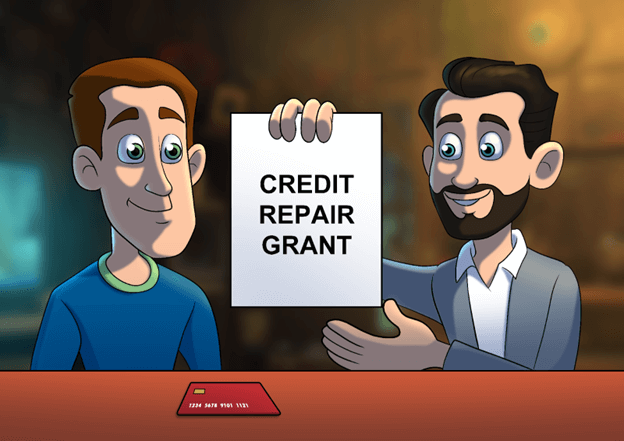- Blogs
- /
- Unlocking Opportunities with Credit Repair Grants: A Comprehensive Guide
Unlocking Opportunities with Credit Repair Grants: A Comprehensive Guide

In a society where credit scores can significantly influence economic well-being, the concept of credit repair grants is a lifeline to many. These grants are not just a financial relief, but they can launch individuals and businesses onto the path of financial health and stability. Our focus in this article is to discuss everything about credit repair grants.
Credit repair grants become essential when you can’t access essential needs and opportunities due to poor credit scores. Some of these essentials include applying for mortgages and securing personal loans or business loans. With a poor credit score being an obstacle, you can use credit repair grants to float yourself till you get your credit score repaired.
Personal Grants and What They Mean
Both the government and private organizations award grants to individuals. These grants can be monetary, and you do not have to repay them. Worthy of note is that individuals are not the regular recipients of these grants. Most times, government grants are given to universities, research labs, nonprofits, local governments, and small businesses.
The importance of these grants is to help support community projects, fund research, and help stimulate the economy or with recovery initiatives. You can find information on those that are more likely to get grants on USA.gov.
However, despite the fact that the federal government and private organizations tend to grant grants to institutions, individuals can also get grants for specific purposes like a work initiative, education, or a community project. Lucky grant applicants can expect to get amounts ranging from hundreds of dollars to thousands of dollars, depending on the need.
Many people tend to conflict grants with government benefit programs like welfare and food stamps. These two are different as grants are not provided to meet basic needs. Instead, the government or private organizations provide grants to help individuals pursue certain opportunities that they would not be able to afford if the grants weren’t available.
Worthy of note is that you need to meet the eligibility criteria of a grant before you can get one. You will need to submit a detailed application for the grant. You might also need to write a proposal, depending on the grant requirement.
You will find all the information you need about applying for a grant on grants.gov. This includes how to apply for federal government funding, how to write proposals and much more. Again, remember that these grants take time, and it might take between 6 months and a year to know if you won.
What are The Uses of Personal Grants
The potential uses for personal grants are limitless, and depending on how you use them, you can utilize the grants for credit repair. Below are some types of grants for you.
1. Education Grants
The government awards federal Pell Grants to some undergraduate students. The prerequisite for getting this grant is having “exceptional financial need” and haven’t earned a degree. Eligible students can get up to $6,895 per year.
2. Home Purchase Grants
Homeownership is a distant dream for many due to poor credit. The good news is specific grants are available for individuals that can help them buy their dream home. These home purchase grants are available to low-income earners, and they can be useful in making down payments for homes.
3. Grants For Supporting Veterans
Another credit repair grant available is the grant for veterans. Some grants are available to help struggling military families or personnel sort out expenses. In addition, some of these grants are available to give veterans career assistance. An example of such is the Unmet Needs Program, which provides veterans financial aid of up to $1,500 for different needs.
4. Professional Work Grants
Private organizations often provide grants to professionals across various fields to fund career development and projects. While many of these grants cater to scholars and researchers, opportunities extend to other professionals. The Fund for Investigative Journalism, for instance, supplies journalists with grants of up to $10,000 for their projects. National Geographic also awards grants to professionals, termed “Explorers,” engaged in fields like science, conservation, and technology. Their grant programs range from $20,000 for emerging professionals to a substantial $100,000 for established ones with impactful ventures.
Healthcare Needs

Several organizations provide grants to individuals struggling with certain medical costs. For instance, various charities grant financial assistance, ranging from a few hundred to several thousand dollars, to those who need help affording in-vitro fertilization treatment. FertilityIQ has compiled a list of some of these grants available.
How To Apply For a Personal Grant That Can Help With Credit Repair
There are different types of grants available, and depending on the grants you are interested in, you will have to file for each grant individually with the grantmaker. Remember, competition for all grants is fierce, which means you need to pay close attention to your application and make it perfect to stand a chance. Here’s how to get started:
1. Find The Grants For You
The official portal to find federal government grants is Grants.gov. However, the portal only lists grants for organizations working on projects and programs that the government funds. However, you’ll find current grant opportunities on the non-government portal USGrants.org. You can also head to Benefits.gov to find both grants and financial assistance programs. Remember that this portal shows both grant and non-grant programs. In light of this, you need to read carefully to avoid any mistakes on your part.
Aside from government grants, you can also find grants through private organizations. One way to easily find these is by using your Google search effectively. You can do this by Googling “grants for [insert grant need]. For example, “grants for business.” In addition, you also need to be careful as some of these “grants” are not actually grants, and you might need to pay them back.
2. Confirm You are Eligible
Most times, grantmakers show the eligibility criteria for the grants. You should endeavor to read these carefully so as not to waste your time applying for a grant that you do not meet its requirements. Some of the restrictions you might face while applying for these grants include location, age, income, and career experience.
3. Research Extensively
When preparing to apply for a grant, it’s critical to examine the providing organization meticulously. Be cautious of any program demanding application fees or promoting “free money.” The prevalence of grant fraud is high, with opportunists capitalizing on those seeking financial aid. Hence, it’s crucial to stay vigilant and watch for any potential warning signs.
4. Follow The Steps Meticulously
Each grantmaker uses a distinct application process. To optimize your chances of success, it’s crucial to examine and adhere to the outlined application steps attentively. You may need to provide documentation to demonstrate financial necessity or other supporting evidence.
Often, a well-drafted proposal is required, outlining how you intend to utilize the granted funds. Invest time in composing a powerful proposal, incorporating relevant data, visuals, or tables to aid your argument. Proofreading is a must, and seeking critique from trusted friends or family will help you root out any oversights or errors before you submit your application.
5. Submit and Wait
After submitting your application, all you have to do is wait for the application decision. This can take months before a decision is made. Worthy of note is that winning the grant is not always the end, as you might need to provide proof that you used the grant for the stated purpose. Lest we forget, some grants are taxable, so you should check with the IRS to ensure you are complying with tax rules for the grant.
What is Considered Low Income?
If you’re one of the many hardworking Americans struggling to get by, you might find that the term “low income” doesn’t fully encompass the financial challenges you’re up against. When it comes to federal government debt relief programs, it’s important to understand the technical distinction between “low-income” and “poverty-level” households.

“Poverty-level households,” officially known as federal poverty guidelines, are based on the minimum income needed to cover essentials like food, clothing, shelter, and transportation. In contrast, a “low-income” household is one whose previous year’s taxable income doesn’t exceed 150% of the poverty guidelines.
For instance, in 2022, the federal poverty guideline for a one-person household in the contiguous 48 states was $13,590. This means a one-person household considered low-income would have an annual income of $20,385. Alaska and Hawaii have higher guidelines due to their elevated cost of living.
The U.S. Department of Health and Human Services (HHS) updates these poverty guidelines annually, taking into account income and household size to ensure they reflect real economic circumstances.
Differences Between a Government Grant and Business Loan
We have talked about grants, with a focus on personal grants. It is also important that we take a look at business grants and how they differ from business loans. Although they are both different, they also have some similarities. One of the similarities is that they both help provide capital for business.
1. Business Grants
Business grants, like personal grants, come in different sizes, and they have a lot of things in common. First, when you are successful with a business grant, you do not have to repay the money. Secondly, business grants are intended to help the grantmaker reach a certain goal.
Furthermore, most business grants are designed to help business owners who have had problems getting financing for their business from banks and investors. Some of these troubles can be caused by bad credit, which you might need credit repair for.
Worthy of note is that there is strong competition for business grants, and often, these grants are only available for existing businesses. In light of this, if you are just starting your business, there’s a high chance that you won’t qualify for the grant.
2. Business Loans
On the other hand, business loans are financing you get that you must pay back. Some of these loans can be short-term, between six to 24 months, or long-term, over three years. The goal of the lender is to make more money, which is why it differs from grants, whose aim is to fulfill a mission.
In light of this, a lender’s major concern when offering you a business loan is to see if you’ll be able to repay the loan and the interest. Again, many business loans are for businesses that have been in operation for a while, usually more than two years.
Depending on your business history, lenders might consider your personal credit history, business credit, or both when assessing your loan reports. You can check your credit report to see if you are in good standing. If not, you can schedule a free credit repair session on GreatCreditFast.com.
Final Words
In wrapping up, securing grants to tackle personal expenses, particularly credit repair, may seem like a daunting task. Personal grants, including ones that can help with credit repair, offer an encouraging solution for eligible individuals. When applying, ensure you understand the particulars of the grant, meet the eligibility criteria, and create an application that genuinely depicts your financial needs.
Lastly, be aware that while grants can alleviate immediate financial strains, utilizing these funds wisely is paramount for long-term financial stability. The road to repairing your credit might be tough, but with diligence and resilience, restoring your financial health is entirely achievable.